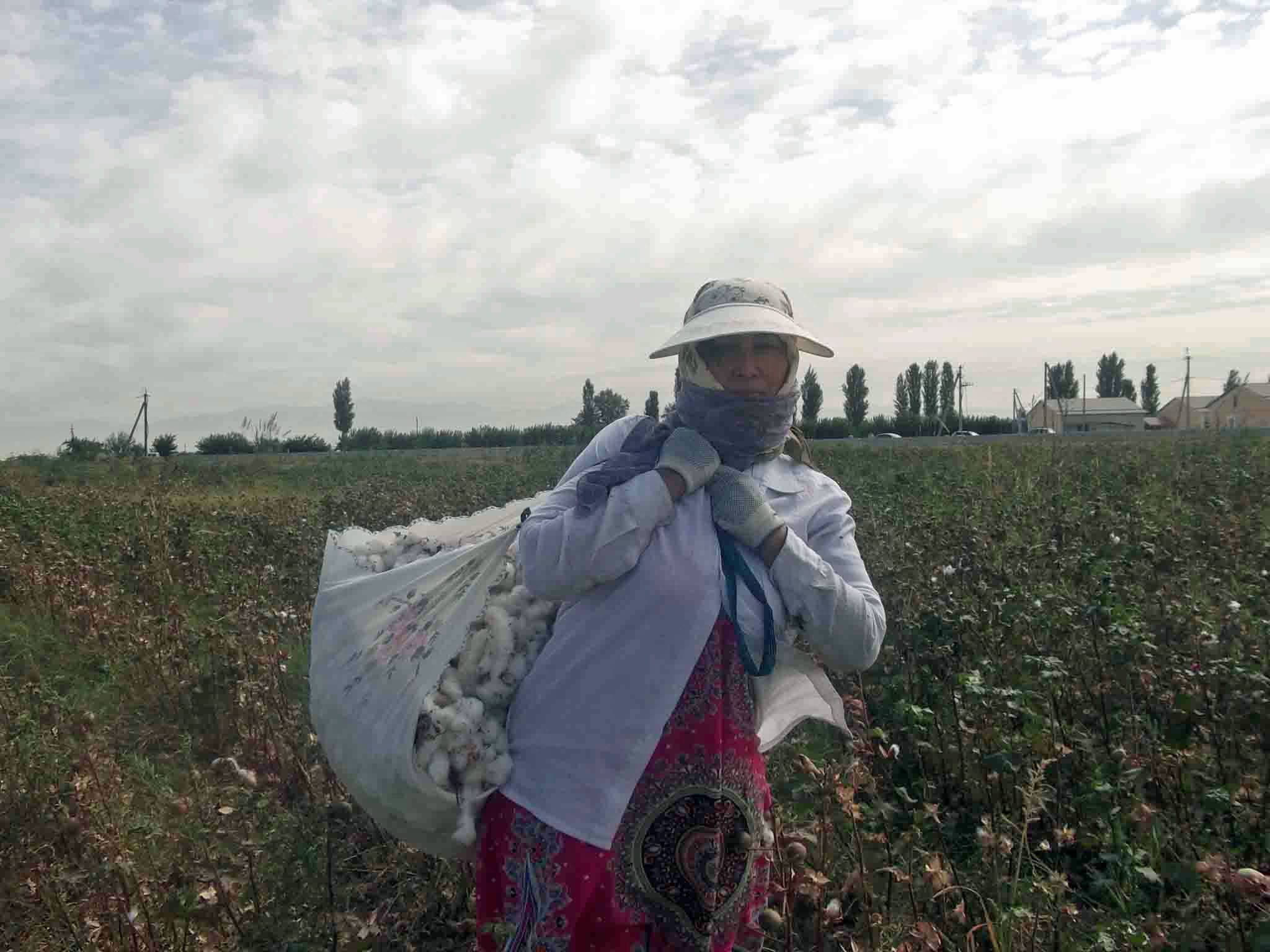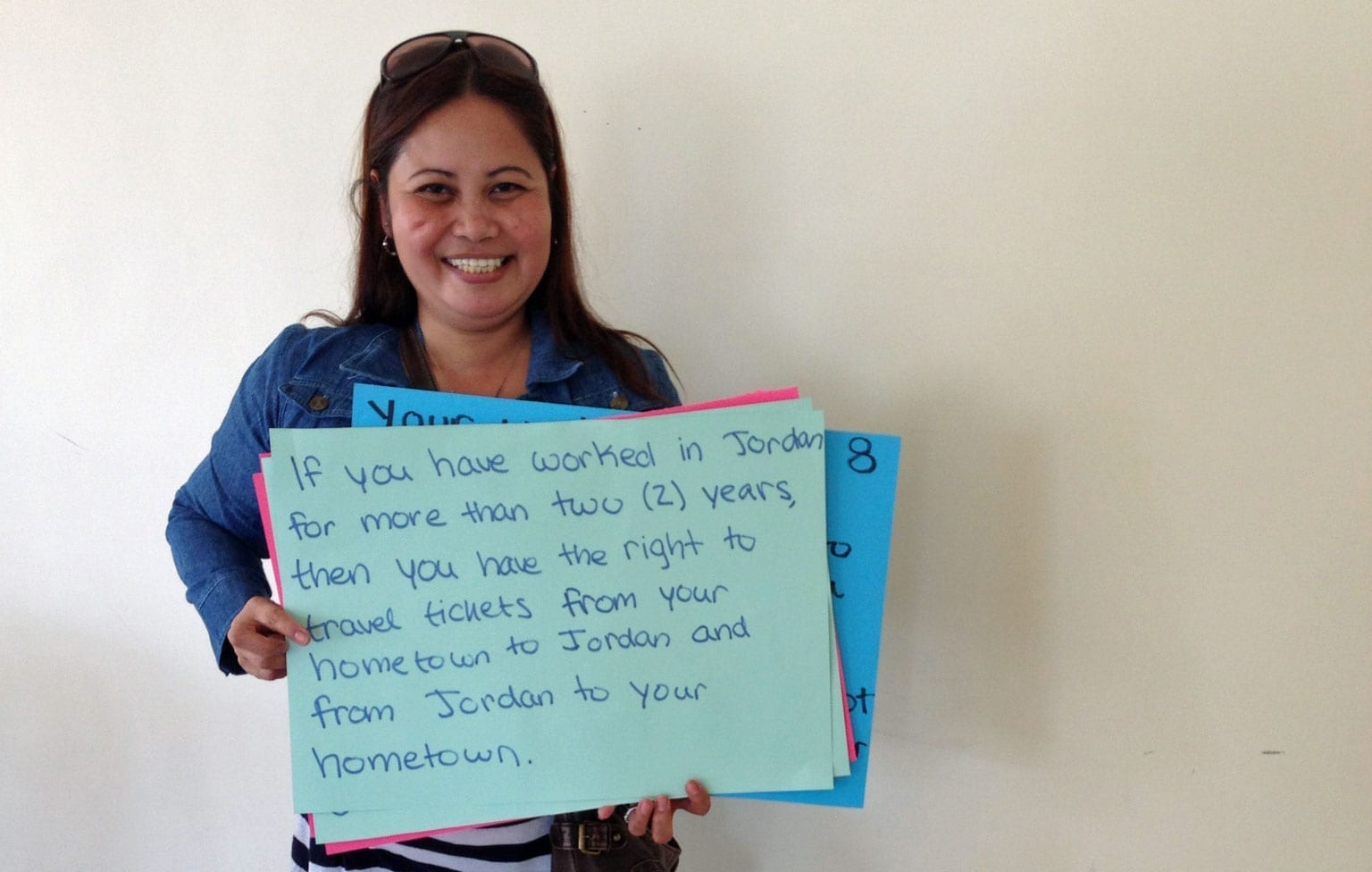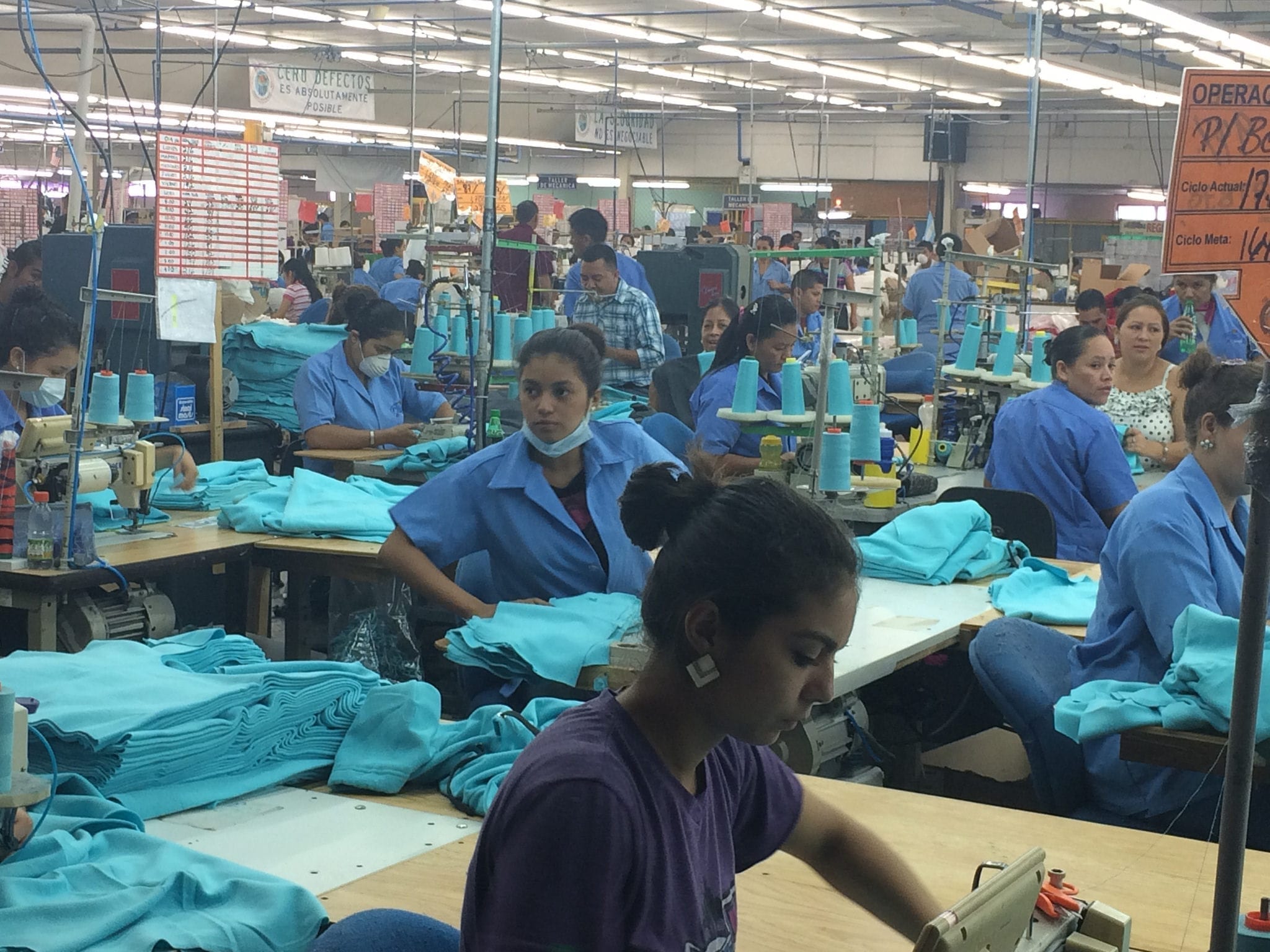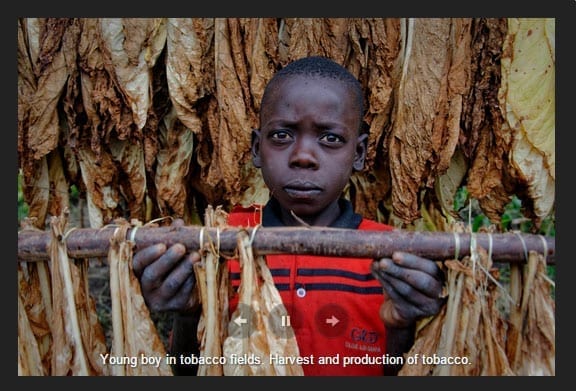
Jun 16, 2015
Labor and human rights groups are applauding a statement by United Nations (UN) Secretary-General Ban Ki-moon who said during a recent visit to Uzbekistan that more must be done now to address “the mobilization of teachers, doctors and others in cotton harvesting, and prevent the maltreatment of prisoners.”
On June 5, dozens of labor and human rights organizations, including the Solidarity Center, sent a letter to Ban Ki-moon urging him to raise the issue of forced labor in which the government requires teachers, doctors and others to pick cotton each fall.
During each fall harvest, Uzbekistan’s government forces teachers, doctors and other health care professionals to pick cotton. At least 17 people died and numerous others were injured during last year’s harvest. Workers were forced to toil long hours picking cotton in unsafe and unhealthy working conditions that often included no access to clean drinking water. Students receive little or no education and medical care is inaccessible for weeks until the harvest is completed.
In the letter, the organizations called the Uzbekistan cotton harvest “one of the largest state-orchestrated systems of forced labor in the world for decades,” and listed six steps the Uzbekistan government should take, including permitting human rights organizations and journalists to investigate and report conditions in the cotton sector without retaliation.
Earlier this month, human rights activists Elena Urlaeva says she was arrested and assaulted by police as she sought to document the Uzebek government’s forced mobilization of teachers and doctors for the spring cotton harvest.
Noting that Uzbekistan has enacted legislation to protect the rule of law, Secretary-General Ban noted, “But laws on the books should be made real in the lives of people,” indicating the government has not properly implemented its own legislative framework.

Jun 16, 2015
On a trip to Kuwait two years ago, Nisha Varia from Human Rights Watch visited a hospital where two rooms were filled with injured domestic workers who had tried to escape from their employers’ homes. Trapped in abusive situations, the women jumped from windows or were beaten by employers as they sought to leave.
The experience for domestic workers in Middle Eastern Gulf states, and in many countries around the world, has not significantly improved since then, said Varia and others at a recent panel in Washington, D.C., “Migrant Workers in the Gulf States: Transnational Policy Responses to Protect Labor Rights.”
In the Gulf, “employers feel they have bought domestic workers because they paid the recruitment fee,” Varia said. The situation is exacerbated in Gulf countries by the kefala system, which ties employment of foreign workers to their employers, and makes it illegal for workers to get another job in the country. Employers also typically take the passports of domestic workers, who toil unseen from the public and are especially vulnerable to abuse.
June 16, International Domestic Workers Day, marks the fourth anniversary of the adoption of the United Nations Convention 189 on Domestic Workers, a landmark standard championed by unions, civil society groups and human rights organizations worldwide. Its passage signaled the global community’s recognition that the 53 million workers who labor in households, often in isolation and at risk of exploitation and abuse, deserve full protection of labor laws.
The historic action indicated the recognition that domestic workers, 83 percent of whom are women, perform work—and that entails rights equal to all other wage earners. Eighteen countries have ratified the Convention since its passage. (ILO resources for and information on domestic workers here.)
The panel, which encompassed broader issues of labor migration, highlighted the overlap between domestic workers and migrant workers. The Solidarity Center works with domestic workers in countries such as Dominican Republic, where most domestic workers are from Haiti and in Jordan, where domestic workers have migrated for work from the Philippines, Malaysia and other countries.
In Jordan, the Solidarity Center is assisting domestic workers build support for their rights on the job. In a first-of-its-kind network, some 250 domestic workers meet regularly, with translation conducted simultaneously in three, or sometimes four, languages. The Domestic Workers Network in Jordan is cooperating with the International Domestic Workers Federation (IDWF), which formed to help push the ILO Domestic Workers convention and which now represents workers around the world.
Panel participants pointed to the common experiences of those who migrate for jobs, especially domestic workers. After they arrive in the destination country, their cell phones often are confiscated and contact with their families is limited. They are completely excluded from the country’s labor laws, typically do not get any days off and generally do not receive the wage they were promised.
Varia likened the experience of migrant domestic workers to abusive domestic violence situations in which employers exert power by withholding food from domestic workers and force them to sleep on the floor or in closet-like spaces.
In their studies, panelists found that when migrant workers understand their rights before they migrate, they are more likely to leave abusive situations quickly, indicating the value of programs that educate domestic workers and other potential migrants in their home countries.
A better solution, they agreed, is the availability of employment at home.
“If people could find good jobs, they wouldn’t migrate,” Varia said.
Other panelists included: Mahendra Pandey, a former migrant worker; Sarah Paoletti, director of the University of Pennsylvania’s Transnational Legal Clinic; and Eleanor Taylor-Nicholson, an independent consultant on migrant worker rights. Shannon Lederer AFL-CIO director of immigration policy, moderated the panel, sponsored by the AFL-CIO and Solidarity Center.

Jun 15, 2015
Apparel workers in Honduras formed unions at three factories in recent days with the Central General de Trabajadores Honduras (CGT) and its apparel federation FESITRATEMASH, in a huge victory for workers seeking to improve their basic livelihoods.
Some 9,000 workers at the Canadian-owned Gildan apparel factories in Choloma, San Pedro Sula and Villanueva make T-shirts, sweatshirts and sweatpants. Gildan recently surpassed Fruit of the Loom as Honduras’s largest private-sector employer.
“With the organization of these unions we the workers now have a voice on the job and a mechanism to negotiate over the conditions of work at Gildan,” says Nahun Rodriguez, President of the SITRAGAVSA union at Gildan Villanueva.
Meanwhile, apparel workers at a Fruit of the Loom factory in Villanueva, Honduras, and their CGT-affiliated union SITRAMAVI last week negotiated a first collective bargaining agreement covering 1,200 workers. The workers cut and sew T-shirts and sweatshirts.
The union organizing at the Gildan factories further expands the membership of CGT and FESITRATEMASH, which represent workers at four Fruit of the Loom factories, and is a significant step forward for apparel workers employed by major multinational apparel brands in the country’s export processing zones.
Honduran labor laws meant to protect workers from the health and safety risks posed by textile factory work are rarely enforced, and there is a severe shortage of factory inspectors who can investigate the working conditions of the hundreds of maquilas—many of them sweatshops.
The majority of clothing and textile workers are women who face particular challenges in the workplace, including sexual harassment, denial of maternity leave and forced pregnancy tests during the job application process. Last fall, a Solidarity Center delegation to Honduras found the level of rights violations, repression of activists and economic hardship experienced by millions of workers “overwhelming.”
The recent victories build on years of Solidarity Center training with CGT, including education on workers’ legal rights, fundamental union principles and union organizing. The Solidarity Center also has trained and mentored organizers who conduct worker outreach to further educate workers on their rights, build organizing committees and seek legal registration of unions.
In 2009, CGT represented one apparel union that was nearly disbanded when Fruit of the Loom shut down the factory to avoid bargaining with workers. As part of an internationally backed campaign, the union reached an historic agreement with Fruit of the Loom to reopen the factory, hire back the workers, provide a welfare fund for the workers for the year they were unemployed, recognition of the union and the negotiation of a collective bargaining agreement.
From that victory, the CGT has now has organized workers at nine more factories, and negotiated collective bargaining agreements at six of them. Nine of the 10 are apparel factories and one is an automobile parts manufacturer.
The Solidarity Center also has provided CGT with legal aid to help workers obtain more than $1.7 million of back wages at three factories that closed without paying workers their wages.
Also as part of the multi-year strategy developed with CGT, the Solidarity Center supported CGT in negotiations with employers and the government, achieving a national-level agreement among labor, business and the government that includes providing housing for apparel workers and daycare centers for apparel workers’ children.

Jun 12, 2015
Some 168 million children remain trapped in child labor—11 percent of the world’s child population—even as 200 million youth in 2012 were working but earning less than $2 per day, according to an International Labor Organization (ILO) report released this week.
“Both child labor and the youth decent work deficit are symptomatic of the general lack of sustained, inclusive and sustainable economic growth in the global economy and in developing economies in particular,” according to the report.
Released in advance of World Day Against Child Labor June 12, the report focuses on the twin challenges of eliminating child labor and ensuring decent work for youth. “Achieving decent work for all will not be possible without eliminating child labor and erasing the decent work deficit youth face,” the report notes.
“World Report on Child Labor 2015: Paving the Way to Decent Work for Young People,” finds that at its core, child labor is about a lack of good jobs for adults—decent work with good wages and social protections that enables parents to support their families.
The report describes a self-perpetuating cycle of low-wage, low-skilled work opportunities that in turn provides no incentive for parents to keep their children in school because they have fewer reasons to delay their children’s entry into work and to incur the costs associated with their children’s schooling. Conversely, increased demand for skill translates into increased investment in education, the report finds.
The report also examines the worst forms of child labor, in which 85 million children under age 18 toil in hazardous work that directly harms their health, safety or moral development. Girls are especially vulnerable to worst forms of child labor, such as commercial sexual exploitation, and to hidden forms of child labor, such as domestic work outside their own homes.
Some 46.5 million adolescents age 15–17 years labor in hazardous work—40 percent of all employed 15–17 year-olds, according to the report.
Among them are child laborers in Ghana’s gold mines who pull the gold ore out of shafts, carry and crush loads of ore and process it with toxic mercury, according to a Human Rights Watch report also released this week.
“Precious Metal, Cheap Labor: Child Labor and Corporate Responsibility in Ghana’s Artisanal Gold Mines,” documents the use of child labor in Ghana’s unlicensed, mines, where most mining takes place. It is estimated that thousands of children work in hazardous conditions in violation of Ghanaian and international law.
Many local gold traders have done little to determine whether the gold they buy is produced with child labor, and regularly bought at unlicensed mining sites, where child labor often occurs, the report finds. The Ghanaian government-owned gold trading company, the Precious Metals Marketing Company, has no procedures to determine whether children have been involved in producing the gold it purchases. It provides trading licenses to about 700 buying agents and trading companies without obliging traders to use any human rights criteria, including regarding child labor, when purchasing gold.
Jun 11, 2015
As the FIFA corruption scandal widens and pressure builds to move the World Cup from countries tainted by the investigation, a deeper human tragedy may be unfolding: The economically fragile situation of migrant workers who build infrastructure for global sporting events will only worsen if they lose their jobs abroad and have no employment to return to at home, writes the Solidarity Center’s Sonia Mistry.




